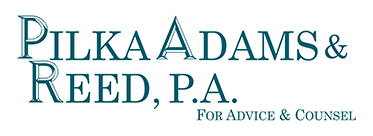Estate Planning Is For Everyone
By J. Scott Reed, Esquire
Estate planning isn’t only for the elderly or wealthy. A well-drafted plan does more than distribute property. With careful planning, you can accomplish the following:
- Insure that your wishes for your estate are carried out. Without a will, those wishes will most likely not be followed and your assets will pass to your heirs according to the laws of intestacy.
- Plan for children or other beneficiaries with special needs: A child or beneficiary with special needs risks being disqualified from receiving SSI or other government benefits and may have to use their inheritance from your estate to pay for their care. Depending upon the situation, a Special Needs Trust may be appropriate.
- Plan for your incapacity. People are living longer and, therefore, your risk of diminished capacity during your lifetime is increasing. Only with proper estate planning, can you be sure that your health and financial affairs will be taken care of in the event of your inability to take care of them yourself.
- Plan for your business. In a properly executed plan, you can determine who will own and control your business upon your death and insure that the business will continue as a viable operation.
- Plan for your minor children. If you have minor children, you should have a will nominating personal guardians for them, in the event that both you and your spouse should die prior to the time they reach the age of 18. Without a plan, the court will decide without your input where the kids will live and who will make important decisions about their money, education and life.
Additionally, if you have an estate plan in place, be sure to avoid some of the most common planning mistakes:
- Fund your Revocable Living Trust. You may have a beautiful and properly drafted trust agreement. However, unless you transfer property into it, your trust is worthless.
- Insure your beneficiary designations are correct. Not updating the beneficiary designations on bank accounts, life insurance, IRAs and other assets can lead to unintended beneficiaries.
- Understand the tax implications of life insurance proceeds: Many people do not realize that life insurance proceeds are normally included in the taxable estate of the deceased, which can result in a significant portion of the proceeds being paid to the IRS instead of your intended beneficiaries. Depending upon the situation, an Irrevocable Life Insurance Trust may be appropriate.
- Periodically review and update your estate plan. Generally, people do not like to discuss dying and, therefore, people often want to simply execute their estate plan documents and be done with it. However, economic, family, and health changes often require revisions to your estate plan.
- Obtain professional counsel when preparing or modifying your estate plan. Even if a self-prepared will, trust or other planning document is legally enforceable, estate planning is a complex legal process requiring knowledge in several areas of the law, including estate law, tax law and property law as starters. It is important to understand the consequences of your estate plan to your beneficiaries and your estate.
If you need to prepare an estate plan or you would like to update your existing plan, contact the attorneys of Pilka Adams & Reed, P.A. We have attorneys to assist you in Brandon, Tampa, and Lakeland Monday through Friday. Before and after hour as well as weekend appointments are available upon request.

